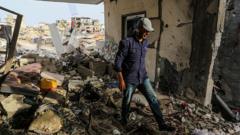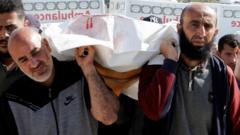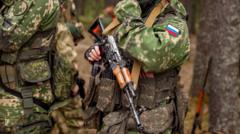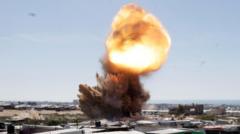In a passionate speech, Abbas urges Hamas to relinquish hostages and control of Gaza, escalating tensions between the two factions.
**Abbas Demands Hamas Disarmament and Hostage Release in Fiery Address**
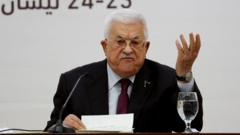
**Abbas Demands Hamas Disarmament and Hostage Release in Fiery Address**
Palestinian Authority President Mahmoud Abbas issues strong statements against Hamas amid ongoing conflict with Israel.
Mahmoud Abbas, the President of the Palestinian Authority, delivered a powerful denunciation of Hamas during a meeting in Ramallah, calling the group "sons of dogs" and vociferously demanding the release of hostages that Hamas is still holding. He asserted that Hamas has provided Israel with "excuses" to perpetuate its attacks on Gaza, and called for the group to disarm and return control of Gaza to the Palestinian Authority as a means to terminate the ongoing war.
In his remarks, made during a session of the Palestinian Central Council, Abbas condemned Hamas's role in the conflict that has lasted nearly two years, stating that they have obstructed peace efforts and perpetuated suffering. He demanded, "Release whoever you’re holding and be done with it," indicating his frustration with the situation.
This was the most vehement critique Abbas has vocalized against Hamas since the conflict erupted 18 months ago. The comments were met with outrage from Hamas officials, who accused Abbas of using derogatory language to address a portion of his own populace. Tensions ran high as Bassem Naim, a member of Hamas’s political bureau, criticized Abbas for blaming his own people for the continued violence at the hands of Israel.
Last week, Hamas rejected an Israeli ceasefire proposal that included the disarmament of its forces in exchange for a halt in hostilities and the release of some hostages. Hamas maintains its stance that it will only consider a complete end to the war and Israeli withdrawal in return for all hostages. The geopolitical dynamic remains complicated as Abbas's Palestinian Authority, primarily governing the West Bank, seeks to reclaim leadership over post-war Gaza.
Abbas's call to action coincides with continued Israeli military operations in Gaza, which have resulted in precise strikes aimed at Hamas infrastructure. On Wednesday alone, an Israeli air operation led to multiple casualties at a school sheltering displaced families. These military actions, coupled with a prolonged blockade of humanitarian aid, have exacerbated a dire situation for Gaza's 2.1 million residents, as reported by the UN.
Foreign ministers from the UK, France, and Germany have denounced the blockade as "intolerable," urging for the swift reintroduction of humanitarian supplies. Meanwhile, Israel asserted that its military actions are aimed at countering the violence initiated by Hamas, claiming that the organization misappropriates aid provided for civilians.
With the death toll in Gaza rising excessively since the beginning of hostilities—over 51,300 casualties reported—the ongoing clash highlights the urgent need for a cohesive Palestinian leadership and a resolution that addresses the humanitarian crisis while addressing the factional divide within Palestine.
In his remarks, made during a session of the Palestinian Central Council, Abbas condemned Hamas's role in the conflict that has lasted nearly two years, stating that they have obstructed peace efforts and perpetuated suffering. He demanded, "Release whoever you’re holding and be done with it," indicating his frustration with the situation.
This was the most vehement critique Abbas has vocalized against Hamas since the conflict erupted 18 months ago. The comments were met with outrage from Hamas officials, who accused Abbas of using derogatory language to address a portion of his own populace. Tensions ran high as Bassem Naim, a member of Hamas’s political bureau, criticized Abbas for blaming his own people for the continued violence at the hands of Israel.
Last week, Hamas rejected an Israeli ceasefire proposal that included the disarmament of its forces in exchange for a halt in hostilities and the release of some hostages. Hamas maintains its stance that it will only consider a complete end to the war and Israeli withdrawal in return for all hostages. The geopolitical dynamic remains complicated as Abbas's Palestinian Authority, primarily governing the West Bank, seeks to reclaim leadership over post-war Gaza.
Abbas's call to action coincides with continued Israeli military operations in Gaza, which have resulted in precise strikes aimed at Hamas infrastructure. On Wednesday alone, an Israeli air operation led to multiple casualties at a school sheltering displaced families. These military actions, coupled with a prolonged blockade of humanitarian aid, have exacerbated a dire situation for Gaza's 2.1 million residents, as reported by the UN.
Foreign ministers from the UK, France, and Germany have denounced the blockade as "intolerable," urging for the swift reintroduction of humanitarian supplies. Meanwhile, Israel asserted that its military actions are aimed at countering the violence initiated by Hamas, claiming that the organization misappropriates aid provided for civilians.
With the death toll in Gaza rising excessively since the beginning of hostilities—over 51,300 casualties reported—the ongoing clash highlights the urgent need for a cohesive Palestinian leadership and a resolution that addresses the humanitarian crisis while addressing the factional divide within Palestine.

